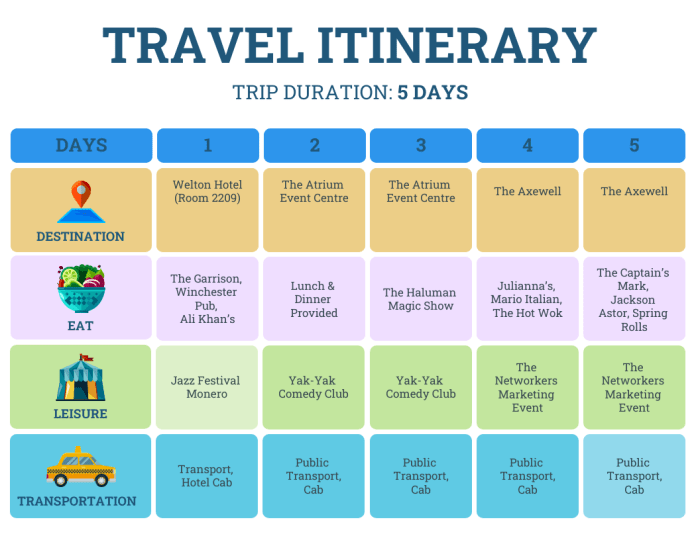Round The World Travel Routes: Dreaming of circumnavigating the globe? This isn’t just a fantasy; it’s a meticulously planned adventure waiting to unfold. From crafting the perfect itinerary to navigating visa requirements and budgeting effectively, this guide equips you with the knowledge and strategies to make your dream a reality. We’ll explore diverse travel styles, transportation options, and crucial safety tips, transforming your global journey from a daunting prospect into an achievable and unforgettable experience.
We’ll delve into the practical aspects of planning a round-the-world trip, including creating realistic budgets, packing smart, and understanding the nuances of international travel. Whether you’re a seasoned traveler or a first-timer, this comprehensive resource provides the actionable steps to plan and execute a truly epic adventure.
Safety and Security Considerations: Round The World Travel Routes

Embarking on a round-the-world journey is an incredible adventure, but it’s crucial to prioritize your safety and security throughout your travels. Failing to plan for potential risks can significantly impact your experience, turning a dream trip into a stressful ordeal. Proactive planning and a realistic assessment of potential dangers are essential for a smooth and enjoyable trip.
Round-the-world travel exposes you to a diverse range of environments and cultures, each with its own unique set of potential hazards. From petty theft to more serious crimes, navigating unfamiliar territories requires careful consideration and preparation. Understanding the risks and implementing effective mitigation strategies is paramount to ensuring a safe and rewarding adventure.
Potential Safety Risks and Mitigation Strategies
A comprehensive safety plan should address various potential threats. Ignoring even seemingly minor risks can have significant consequences. By proactively addressing these issues, you’ll be better equipped to handle unexpected situations and enjoy a more secure trip.
- Petty Theft: Pickpocketing and bag snatching are common in crowded tourist areas. Mitigation: Keep valuables close, use secure bags, and be aware of your surroundings. Avoid displaying expensive jewelry or electronics.
- Scams and Fraud: Tourists are often targeted by scams involving transportation, accommodation, or currency exchange. Mitigation: Research reputable companies beforehand, be wary of unsolicited offers, and verify information independently.
- Violent Crime: While rare in many areas, the possibility of violent crime exists. Mitigation: Avoid walking alone at night in unfamiliar or poorly lit areas. Be aware of your surroundings and trust your instincts. Consider travel insurance that covers medical emergencies and evacuation.
- Health Risks: Exposure to unfamiliar diseases, food poisoning, and accidents are all potential risks. Mitigation: Consult your doctor about necessary vaccinations and medications. Practice safe food and water hygiene, and obtain comprehensive travel insurance.
- Natural Disasters: Earthquakes, floods, and other natural disasters can occur unexpectedly. Mitigation: Monitor weather forecasts, be aware of local emergency procedures, and have an evacuation plan.
Importance of Understanding Local Laws and Customs
Respecting local laws and customs is not just polite; it’s essential for your safety and the success of your trip. Ignorance of local regulations can lead to legal trouble, cultural misunderstandings, and even endanger your personal safety. Thorough research before you go is crucial.
For example, what might be considered acceptable behavior in one country could be offensive or even illegal in another. Understanding these nuances can prevent potentially dangerous situations and ensure a more respectful and enriching travel experience. This includes understanding local laws regarding alcohol consumption, public displays of affection, and dress codes.
Emergency Procedures and Unexpected Situations, Round The World Travel Routes
Having a plan in place for emergencies is crucial. Knowing how to react in unexpected situations can significantly reduce stress and improve your chances of a positive outcome. This involves both preventative measures and a clear action plan for when things go wrong.
- Emergency Contacts: Keep a list of emergency contacts, including local emergency numbers, your embassy or consulate, and family and friends.
- Travel Insurance: Comprehensive travel insurance is essential. It should cover medical emergencies, evacuation, lost luggage, and other unforeseen circumstances.
- Copies of Important Documents: Make copies of your passport, visa, and other important documents and store them separately from the originals.
- Communication Plan: Establish a method for regularly checking in with loved ones, and inform them of your itinerary and planned stops.
- Situational Awareness: Maintain situational awareness at all times. Trust your instincts, and if a situation feels unsafe, remove yourself from it.
Planning a round-the-world trip is an ambitious undertaking, but with careful preparation and a strategic approach, it’s entirely within reach. Remember, the key is to balance meticulous planning with a spirit of adventure. Embrace the unexpected, adapt to new cultures, and savor every moment of this incredible journey. This guide provides the framework; your unique experiences will fill in the vibrant details, creating a story you’ll cherish for a lifetime.
So, pack your bags, ignite your wanderlust, and prepare for the adventure of a lifetime.

